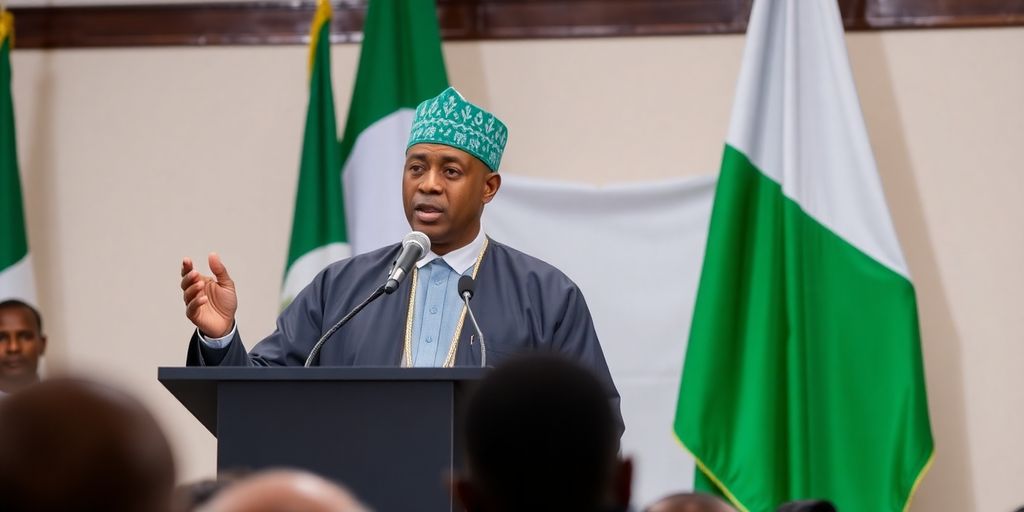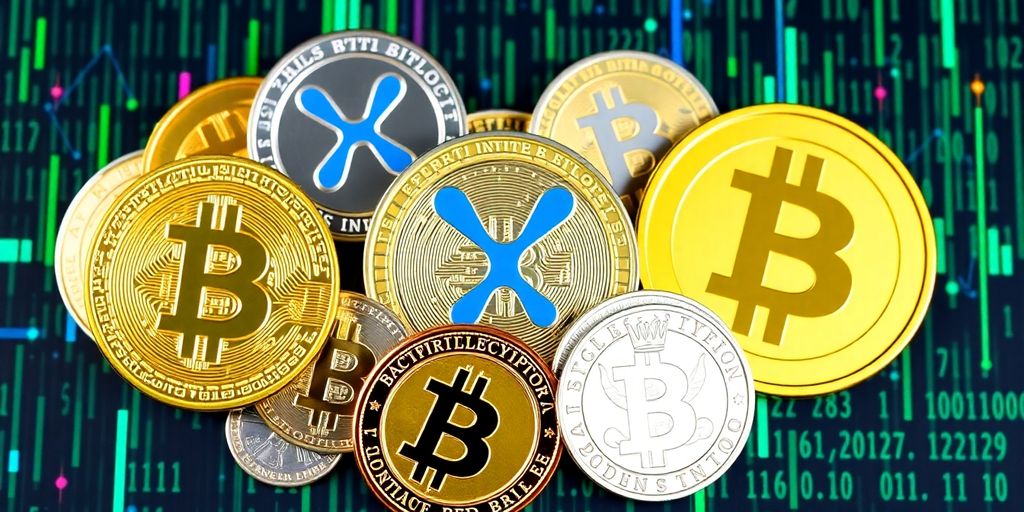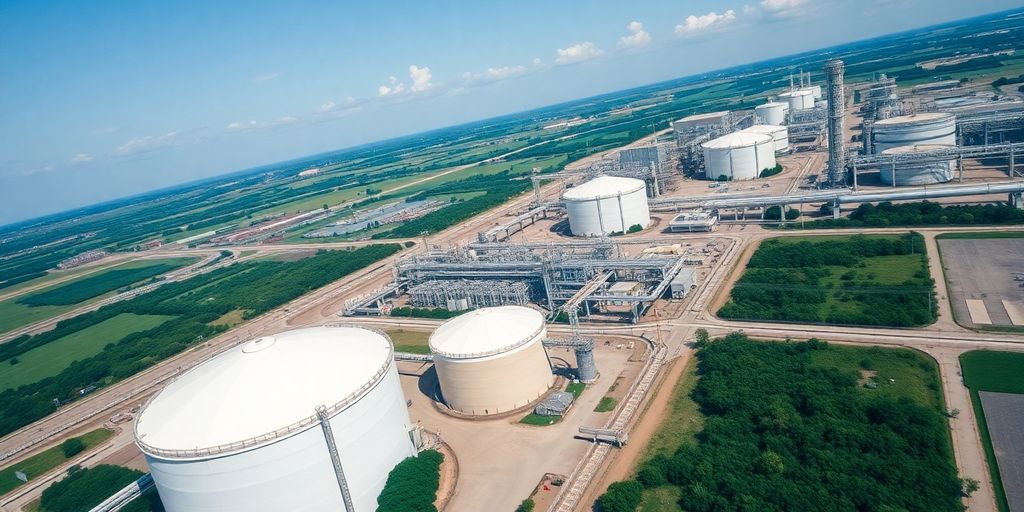Nigeria’s government has announced a big spending plan for 2024, amounting to $34 billion. This budget aims to improve various sectors, including education, healthcare, and infrastructure. However, it also faces challenges such as corruption and economic uncertainty. Understanding the details of this budget is important for both citizens and investors, as it will shape Nigeria’s future.
Key Takeaways
- Nigeria’s 2024 budget is set at $34 billion.
- Major focus areas include education, healthcare, and infrastructure.
- Challenges like corruption and political issues may affect budget execution.
- Public opinion is mixed, with some supporting and others criticizing the plan.
- International organizations may play a key role in funding and support.
Overview of Nigeria’s 2024 Spending Plan
In 2024, Nigeria’s federal government has proposed a $34 billion spending plan aimed at addressing various economic challenges and promoting growth. This budget reflects our commitment to improving the lives of citizens and enhancing national development.
Key Objectives of the Budget
The main goals of this budget include:
- Boosting economic growth through strategic investments.
- Reducing poverty by increasing funding for social programs.
- Enhancing infrastructure to support business and trade.
Historical Context of Nigeria’s Budgets
Looking back, Nigeria’s budgets have often faced challenges such as:
- Inconsistent funding for key sectors.
- High levels of corruption affecting resource allocation.
- Economic downturns impacting revenue generation.
Comparison with Previous Years
When we compare this budget to previous years, we see:
- An increase in total spending compared to 2023.
- A shift in focus towards social welfare and infrastructure.
- More transparency in budget allocation, which is crucial for public trust.
The 2024 budget is a step towards a more accountable and responsive government, aiming to meet the needs of our citizens effectively.
Economic Implications of the $34 Billion Budget

Impact on GDP Growth
The proposed budget aims to stimulate economic growth by investing in key sectors. We believe that a well-structured budget can lead to a positive impact on Nigeria’s GDP. Here are some expected outcomes:
- Increased public spending on infrastructure
- Job creation in various sectors
- Enhanced business environment for local and foreign investors
Inflation and Currency Stability
One of the major concerns with the budget is its potential effect on inflation and the stability of the naira. We recognize that:
- Increased government spending can lead to higher prices.
- A weaker naira may further complicate the situation.
- Maintaining currency stability is crucial for economic confidence.
Investment Opportunities
The budget presents several investment opportunities that we should explore:
- Infrastructure projects that require private sector involvement
- Public-private partnerships in healthcare and education
- Renewable energy initiatives to attract foreign investments
In summary, while the budget has the potential to drive growth, we must remain cautious about inflation and currency issues. The success of this plan will depend on effective implementation and monitoring.
Sectoral Allocations in the 2024 Budget
Education and Healthcare Funding
In the 2024 budget, we are prioritizing education and healthcare. We believe that investing in these areas is crucial for the future of Nigeria. The allocations are as follows:
| Sector | Allocation (in Billion Naira) |
|---|---|
| Education | 1,200 |
| Healthcare | 800 |
Infrastructure Development
Infrastructure is another key area where we plan to invest. We recognize that good roads, bridges, and public transport are essential for economic growth. Our focus will be on:
- Building new roads and bridges
- Upgrading public transport systems
- Expanding electricity access
Defense and Security Spending
Lastly, we are increasing our spending on defense and security. This is important for maintaining peace and stability in the country. The budget for defense will include:
- Modernizing equipment
- Training personnel
- Enhancing intelligence capabilities
We understand that these allocations are vital for the overall development of Nigeria. Our commitment to these sectors reflects our vision for a better future.
Challenges Facing the Implementation of the Budget
Corruption and Mismanagement
One of the biggest hurdles we face is corruption. It can lead to mismanagement of funds, which means that the money intended for important projects might not be used properly. We need to ensure that there are strict checks and balances in place to prevent this from happening.
Political Opposition
Another challenge is political opposition. Different political groups may not agree with the budget, which can slow down its implementation. This disagreement can create delays in projects that are crucial for our development.
Economic Uncertainty
Finally, we must consider economic uncertainty. Factors like inflation and changes in the global economy can affect how well the budget works. If the economy is unstable, it can make it harder to achieve the goals set out in the budget.
We must work together to overcome these challenges to ensure that the budget serves its purpose effectively.
Summary of Challenges
- Corruption can lead to mismanagement of funds.
- Political opposition may delay budget implementation.
- Economic uncertainty can hinder achieving budget goals.
| Challenge | Description |
|---|---|
| Corruption | Mismanagement of funds due to dishonest practices. |
| Political Opposition | Delays caused by disagreements among political groups. |
| Economic Uncertainty | Instability affecting budget effectiveness. |
By addressing these challenges, we can work towards a more effective implementation of Nigeria’s budget for 2024.
Public Reaction to the Spending Plan

Opinions from Economic Experts
As we analyze the public reaction to Nigeria’s $34 billion spending plan, it is clear that economic experts have mixed feelings. Some believe that this budget could stimulate growth, while others express concerns about its feasibility. They highlight that Nigeria’s proposed budget for 2025 is the lowest since 2018, which raises questions about future economic stability.
Public Sentiment and Concerns
The general public’s response has been varied. Many citizens are hopeful, but there are significant worries about how the budget will be implemented. Key concerns include:
- Corruption in the allocation of funds.
- The potential for mismanagement of resources.
- The impact of political opposition on budget execution.
Media Coverage and Analysis
Media outlets have been actively discussing the implications of this spending plan. They emphasize the need for transparency and accountability in how the funds will be used. The coverage often reflects a cautious optimism, urging the government to prioritize essential services and infrastructure development.
The success of this budget will depend on the government’s ability to manage resources effectively and address public concerns.
In conclusion, while there is a sense of hope surrounding the budget, we must remain vigilant about the challenges that lie ahead. The path to successful implementation will require collaboration between the government, experts, and the public.
Role of International Organizations and Partners

In our analysis of Nigeria’s 2024 spending plan, we recognize the significant role that international organizations play in shaping economic policies and providing support. These organizations, such as the IMF and World Bank, are crucial in offering financial assistance and guidance to help Nigeria achieve its budgetary goals.
Influence of the IMF and World Bank
The International Monetary Fund (IMF) and the World Bank are key players in Nigeria’s economic landscape. They provide not only funding but also expertise in economic management. Their influence can be seen in several areas:
- Financial Aid: Direct funding to support various sectors.
- Policy Advice: Recommendations on economic reforms.
- Capacity Building: Training programs for government officials.
Foreign Aid and Investments
Foreign aid and investments are vital for Nigeria’s development. They help bridge the gap between the budget and actual needs. Some important aspects include:
- Direct Investments: Attracting foreign companies to invest in Nigeria.
- Grants and Loans: Financial support for specific projects.
- Technical Assistance: Help in implementing projects effectively.
International Trade Relations
Building strong trade relations is essential for Nigeria’s economic growth. This involves:
- Export Promotion: Encouraging local businesses to reach international markets.
- Trade Agreements: Establishing beneficial agreements with other countries.
- Market Access: Ensuring Nigerian products can compete globally.
The collaboration with international partners is not just about funding; it’s about building a sustainable future for Nigeria.
In conclusion, the role of international organizations and partners is crucial in supporting Nigeria’s budgetary framework. Their contributions help us navigate challenges and seize opportunities for growth.
Technological Innovations in Budget Management

Digital Tools for Transparency
In our journey towards a more transparent budget management system, we have embraced digital tools that allow for real-time tracking of government spending. These tools help us ensure that funds are used effectively and that citizens can see how their money is being spent. By utilizing technology, we can foster trust and accountability in our financial processes.
E-Government Initiatives
We have also implemented various e-government initiatives aimed at streamlining budget processes. These initiatives include:
- Online platforms for budget proposals and approvals.
- Digital dashboards that display budget allocations and expenditures.
- Mobile applications that allow citizens to access budget information easily.
These efforts not only improve efficiency but also encourage public participation in the budgeting process.
Data-Driven Decision Making
Finally, we recognize the importance of data-driven decision making in managing our budget. By analyzing data, we can identify trends and make informed choices about where to allocate resources. This approach helps us prioritize spending in areas that will have the most significant impact on our economy and society.
By leveraging technology, we are paving the way for a more efficient and transparent budget management system that benefits all Nigerians.
In conclusion, as we move forward, we must continue to invest in these technological innovations to enhance our budget management practices and ensure a brighter future for our nation.
Environmental Considerations in the Budget
Sustainability and Green Initiatives
In our approach to the 2024 budget, we recognize the importance of sustainability. We are committed to integrating green initiatives that not only protect our environment but also promote economic growth. This includes:
- Investing in renewable energy sources.
- Supporting reforestation projects.
- Encouraging sustainable agricultural practices.
Impact on Natural Resources
The budget also addresses the impact on natural resources. We aim to manage our resources wisely to ensure they benefit future generations. Key points include:
- Monitoring resource extraction to prevent overuse.
- Implementing regulations to protect biodiversity.
- Promoting conservation efforts in vulnerable areas.
Climate Change Mitigation Efforts
We understand that climate change is a pressing issue. Our budget outlines specific mitigation efforts to combat its effects. These efforts involve:
- Enhancing disaster preparedness and response.
- Investing in climate-resilient infrastructure.
- Collaborating with international partners to share knowledge and resources.
As we navigate the landscape of climate finance in Nigeria 2024, we are focused on mobilizing private finance through guarantees and ensuring that our domestic climate budget is effectively tagged to support subnational climate action.
By prioritizing these environmental considerations, we believe we can create a budget that not only addresses immediate needs but also secures a healthier planet for the future.
Future Outlook and Long-Term Goals
Vision for Nigeria’s Economic Future
As we look ahead, our vision for Nigeria’s economic future is centered on sustainable growth and development. We aim to create a robust economy that can withstand global challenges while improving the quality of life for all citizens. This involves focusing on key areas such as education, healthcare, and infrastructure.
Strategic Priorities Beyond 2024
To achieve our vision, we have identified several strategic priorities:
- Enhancing Education: Investing in quality education is crucial for our children’s future. We believe that with a growing focus on academic success, ensuring that every child has access to quality education is a top priority.
- Improving Healthcare: We must strengthen our healthcare system to provide better services and access for all citizens.
- Infrastructure Development: Upgrading our infrastructure will support economic activities and improve living standards.
Potential Risks and Opportunities
While we are optimistic about the future, we must also be aware of potential risks. These include:
- Economic Instability: Fluctuations in global markets can impact our economy.
- Political Challenges: Political opposition may hinder our progress.
- Environmental Issues: Climate change poses a significant threat to our resources.
In summary, our long-term goals are ambitious but achievable. By focusing on education, healthcare, and infrastructure, we can build a brighter future for Nigeria. We must remain vigilant and adaptable to navigate the challenges ahead.
Conclusion
In summary, Nigeria’s proposed $34 billion spending plan for 2024 marks a significant step towards addressing the country’s pressing needs. This budget aims to improve infrastructure, healthcare, and education, which are crucial for the nation’s growth. By focusing on these areas, the government hopes to create jobs and boost the economy. As we look ahead, it will be important to monitor how effectively these funds are used and whether they truly benefit the people. With careful planning and execution, this spending plan could lead to a brighter future for Nigeria.
Frequently Asked Questions
What is the total amount of Nigeria’s spending plan for 2024?
Nigeria’s spending plan for 2024 is $34 billion.
What are the main goals of this budget?
The main goals include improving the economy, providing better public services, and developing infrastructure.
How does this budget compare to previous years?
This budget is larger than many past budgets, showing a focus on growth and development.
What sectors will receive the most funding?
The budget will focus heavily on education, healthcare, and infrastructure projects.
What challenges might Nigeria face in carrying out this budget?
Challenges include corruption, political issues, and uncertain economic conditions.
How do experts feel about this spending plan?
Many experts have mixed feelings; some see it as a good step, while others worry about execution.
What role do international organizations play in Nigeria’s budget?
Organizations like the IMF and World Bank can influence Nigeria’s budget decisions and provide financial support.
Are there any environmental concerns related to the budget?
Yes, there are concerns about sustainability and how the budget will address climate change.





